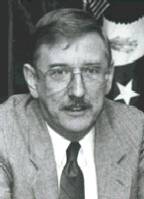 |
(1935 - )
|
Mr. Massacre, from El Salvador to Racak
By Mark Ames and Matt Taibbi.
On January 15, 1999, a U.S. diplomat, William Walker, head of the war crimes verification team of the Organization for Security and Cooperation in Europe (OSCE), visited the Kosovar village of Racak to investigate an alleged Serb massacre of ethnic Albanian peasants. "I do not hesitate to describe the crime as a massacre, a crime against humanity," he said. "Nor do I hesitate to accuse the government security forces of responsibility." Washington responded to this by quickly setting the U.S. military machine in motion.
Walker's background inspires suspicion about the entire Yugoslavia campaign. If William Walker is not a CIA agent, he's done a very bad job of not looking like one. He spent most of his foreign service career in Central and South America. He began his diplomatic career in 1961 in Peru. In the early 1980s, he held the highly controversial post of Deputy Chief of Mission in Honduras, exactly the time and place the Contras were formed.
Walker was promoted, in 1985, to Deputy Assistant Secretary of State for Central America. He was a special assistant to Assistant Secretary of State, Elliot Abrams, who was closely connected to the "Iran-Contra" scandal. According to Independent Counsel Lawrence Walsh's lengthy indictment of Abrams and Oliver North, Walker set up a phony humanitarian operation at an airbase in Ilopango, El Salvador, which funneled guns, ammunition and supplies to Contras in Nicaragua.
Although outed in the international press as a gunrunner, Walker's diplomatic career did not suffer. In 1988, he became ambassador to El Salvador, a state which was still in the grip of U.S.-sponsored state terror.
In late 1989, when U.S.-trained Salvadoran soldiers executed six Jesuit priests and two women, Walker was asked about evidence linking the killings to the Salvadoran High Command. He apologized for chief of staff Rene Ponce, saying "Management control problems can exist in these kinds of situations. I'm not condoning it, but in times of great emotion and great anger, things like this happen."
Shrugging off news of eyewitness reports that the murderers wore Salvadoran army uniforms, Walker said "anyone can get uniforms. The fact that they wore military uniforms was not proof they were military."
Later, Walker recommended to Secretary of State James Baker that the U.S. "not jeopardize" its relationship with El Salvador by investigating "past deaths, however heinous." This is ironic, coming from a man who later recommended that the U.S. go to war with Yugoslavia over heinous deaths.
In 1996, Walker hosted a ceremony in Washington honoring 5,000 U.S. soldiers who fought secretly in El Salvador. While Walker was Ambassador there, the official U.S. story was that only 50 U.S. military advisors in the country (Washington Post, May 6, 1996).
"Ambassador Walker's record certainly does compromise his reliability as an objective witness," said James Morrell, research director, Center for International Policy, Washington.
There is a widespread belief that Walker's role in Racak was to assist the KLA in fabricating a Serb massacre to be used as an excuse for military action. French national TV and two major French newspapers ran exposes on the Racak incident. They cited inconsistencies in Walker's version of events. Even the Los Angeles Times ran a story suggesting the Racak massacre was faked. The theory behind these exposÚs is that the KLA gathered their own dead after the battle, removed their uniforms, put them in civilian clothes and called in the observers. Walker, significantly, did not see the bodies until 12 hours after Serb police left the town. As Walker knows, not only can "anybody have uniforms," anyone can have them taken off, too.
Source: www.emperors-clothes.com/analysis/meetmr.htm Aug.10, 2000.
U.S. Foreign Service officer
Peru (1962-1964)
Japan (1964-1967)
Japan (1964-1967)
Brazil (1969-1972)
El Salvador (1974-1991)
Honduras (1980-1986)
Panama (1985)
Deputy Chief of Mission, Honduras (1980-1982)
Deputy Chief of Mission, Bolivia (1982-1984)
Deputy Assistant Secretary of State for Central America, Office of Inter-American Affairs; worked with Ollie North and was special assistant to Eliot Abrams, helping arm the Contras (1985-1988)
Ambassador, El Salvador (1988-1992); invited death squad leader Roberto d'Aubuisson to U.S. embassy's July 4 party (1989)
Vice Pres., National Defense Univ., Wash., D.C. (1994-97)
hosted a Washington ceremony honoring 5,000 U.S. soldiers who fought secretly in El Salvador (1996)
Special Representative of Secretary General, heading UN Transitional Administration in Eastern Slavonia, Croatia (return E. Slavonia to Croatian control) (1997-1998)
Head, Kosovo Verification Mission, Organization for Security and Cooperation in Europe (1998-1999)
Sources:
alpha.ddm.uci.edu/zotmail/archive/1999/19991109101.html
www.stile.lboro.ac.uk/~gyedb/STILE/Email0002026/m4.html
bushlibrary.tamu.edu/papers/1992/92050804.html